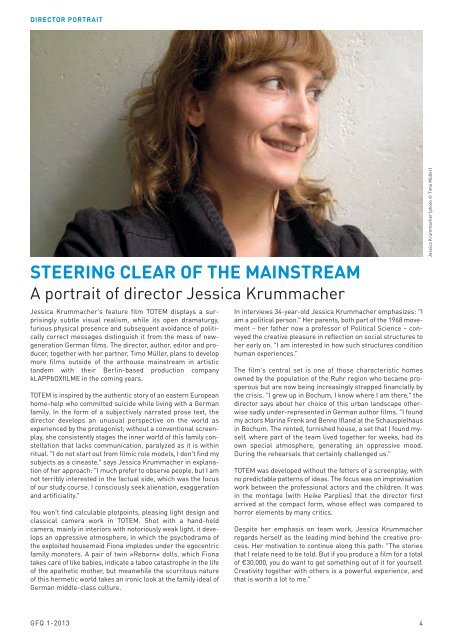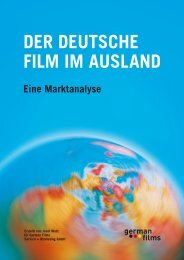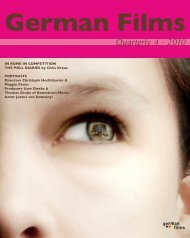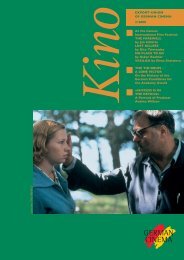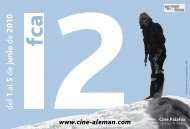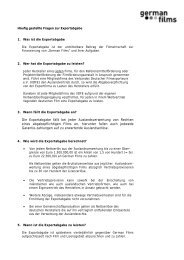B_Cards, neu - german films
B_Cards, neu - german films
B_Cards, neu - german films
Create successful ePaper yourself
Turn your PDF publications into a flip-book with our unique Google optimized e-Paper software.
DIRECTOR PORTRAIT<br />
STEERING CLEAR OF THE MAINSTREAM<br />
A portrait of director Jessica Krummacher<br />
Jessica Krummacher’s feature film TOTEM displays a sur -<br />
prisingly subtle visual realism, while its open dramaturgy,<br />
furious physical presence and subsequent avoidance of politically<br />
correct messages distinguish it from the mass of newgeneration<br />
German <strong>films</strong>. The director, author, editor and producer,<br />
together with her partner, Timo Müller, plans to develop<br />
more <strong>films</strong> outside of the arthouse mainstream in artistic<br />
tandem with their Berlin-based production company<br />
kLAPPbOXfILME in the coming years.<br />
TOTEM is inspired by the authentic story of an eastern European<br />
home-help who committed suicide while living with a German<br />
family. In the form of a subjectively narrated prose text, the<br />
director develops an unusual perspective on the world as<br />
experienced by the protagonist; without a conventional screenplay,<br />
she consistently stages the inner world of this family constellation<br />
that lacks communication, paralyzed as it is within<br />
ritual. “I do not start out from filmic role models, I don’t find my<br />
subjects as a cineaste,” says Jessica Krummacher in explanation<br />
of her approach: “I much prefer to observe people, but I am<br />
not terribly interested in the factual side, which was the focus<br />
of our study course. I consciously seek alienation, exaggeration<br />
and artificiality.”<br />
You won’t find calculable plotpoints, pleasing light design and<br />
classical camera work in TOTEM. Shot with a hand-held<br />
camera, mainly in interiors with notoriously weak light, it develops<br />
an oppressive atmosphere, in which the psychodrama of<br />
the exploited housemaid Fiona implodes under the egocentric<br />
family monsters. A pair of twin »Reborn« dolls, which Fiona<br />
takes care of like babies, indicate a taboo catastrophe in the life<br />
of the apathetic mother, but meanwhile the scurrilous nature<br />
of this hermetic world takes an ironic look at the family ideal of<br />
German middle-class culture.<br />
In interviews 34-year-old Jessica Krummacher emphasizes: “I<br />
am a political person.” Her parents, both part of the 1968 move -<br />
ment – her father now a professor of Political Science – conveyed<br />
the creative pleasure in reflection on social structures to<br />
her early on. “I am interested in how such structures condition<br />
human experiences.”<br />
The film’s central set is one of those characteristic homes<br />
owned by the population of the Ruhr region who became prosperous<br />
but are now being increasingly strapped financially by<br />
the crisis. “I grew up in Bochum, I know where I am there,” the<br />
director says about her choice of this urban landscape otherwise<br />
sadly under-represented in German author <strong>films</strong>. “I found<br />
my actors Marina Frenk and Benno Ifland at the Schauspielhaus<br />
in Bochum. The rented, furnished house, a set that I found myself,<br />
where part of the team lived together for weeks, had its<br />
own special atmosphere, generating an oppressive mood.<br />
During the rehearsals that certainly challenged us.”<br />
TOTEM was developed without the fetters of a screenplay, with<br />
no predictable patterns of ideas. The focus was on improvisation<br />
work between the professional actors and the children. It was<br />
in the montage (with Heike Parplies) that the director first<br />
arrived at the compact form, whose effect was compared to<br />
horror elements by many critics.<br />
Despite her emphasis on team work, Jessica Krummacher<br />
regards herself as the leading mind behind the creative process.<br />
Her motivation to continue along this path: “The stories<br />
that I relate need to be told. But if you produce a film for a total<br />
of €30,000, you do want to get something out of it for yourself.<br />
Creativity together with others is a powerful experience, and<br />
that is worth a lot to me.“<br />
GFQ 1-2013 4<br />
Jessica Krummacher (photo © Timo Müller)


